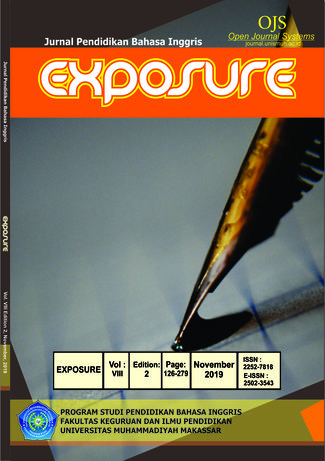ANALYZING CHALLENGES IN GRAMMATICAL KNOWLEDGE FOR EFL STUDENTS: Descriptive Quantitative Study
DOI:
https://doi.org/10.26618/exposure.v8i2.2801Keywords:
Challenge, Grammatical, Knowledge, Developing, EFLAbstract
This research aimed to find out what challenges were faced by EFL students at the English Department Muhammadiyah University of Makassar in their grammatical knowledge. This research used descriptive quantitative. The population of this research was the fourth semester of the English Department Muhammadiyah University of Makassar. The sample or the subject of this research was 50 students taken by accidental sampling technique. The researcher used the questionnaire as the instrument of this research. The result showed that challenges were mostly found by the students in developing their grammatical knowledge were: do not know how to organize the sentences to be a good paragraph, lack of self-confident, lack of vocabularies, lack of tenses and the biggest challenges were learning environment was too crowded, limited of time and lack of facilities.References
Akbari, Z. (2015). Current challenges in teaching/learning English for EFL learners: The case of junior high school and high school. Iran: Isfahan University of Medical Sciences.
Akbari, Z. (2016). The Study of EFL Students’ Perceptions of Their Problems, Needs and Concerns over Learning English: The Case of MA Paramedical Students. Iran: Isfahan University of Medical Sciences.
Al-Mekhlafi, A.M. & Nagaratnam, R.P. (2011). Difficulties in teaching and learning grammar in an EFL context. International Journal of Instruction.
Coghill et.al. (2003). English Grammar. New York: Wiley Publishing, Inc.
Dewi, S. M. (2014). Difficulties in Teaching Grammar in Junior High School. Satya wacana Christian university salatiga.
Effendi et.al. (2017). A Study on Grammar Teaching at an English Education Department in an EFL Context. International Journal on Studies in English Language and Literature (IJSELL).
Mishra, P. (2010). Challenges and problems in the teaching of grammar. Language in India.
Muhsin, M. A. (2015). The Correlation Between Students’ Grammar Knowledge Writing Ability. Indonesia: Muhammadiyah University of Makassar.
Munir, S. (2009). Grammatical Awareness Among Primary School English Language Teachers. GEMA Online Journal of Language Studies.
Refnita, L. (2014). Students’ Grammatical Problems in Writing Simple Paragraphs: Lack of Grammatical Competency or Language Carelessness?. Padang: Bung Hatta University.
Sopin, G. (2015). Students’ Perceptions of Grammar Teaching and Learning in English Language Classrooms in Libya. IOSR Journal of Research & Method in Education (IOSR-JRME).
Swam, M. (2005). Grammar, Meaning and Pragmatics. Hemel Hempstead: Prentice-Hall.
Ur, P. (1988). Grammar Practice Activities: A Practical Guide For Teachers. 1. Vyd. Cambridge University Press, Isbn 9780521338479.
Widianingsih, N. K. A. (2016). Grammatical Difficulties Encountered by Second Language Learners of English. Proceedings of the Fourth International Seminar on English Language and Teaching (ISELT-4).
Yusof, F. K. (2018). Challenges of Teaching Grammar at Tertiary Level: Learning From English Lecturers’ Insights. E-Academic Journal.
Downloads
Published
Issue
Section
License
Authors who publish with this journal agree to the following terms:
In order to assure the highest standards for published articles, a peer review policy is applied. In pursue of the compliance with academic standards, all parties involved in the publishing process (the authors, the editors and the editorial board and the reviewers) agree to meet the responsibilities stated below in accordance to the Journal publication ethics and malpractice statement.
Duties of Authors:
- The author(s) warrant that the submitted article is an original work, which has not been previously published, and that they have obtained an agreement from any co-author(s) prior to the manuscript’s submission;
- The author(s) should not submit articles describing essentially the same research to more than one journal;
- The authors(s) make certain that the manuscript meets the terms of the Manuscript Submission Guideline regarding appropriate academic citation and that no copyright infringement occurs;
- The authors(s) should inform the editors about any conflict of interests and report any errors they subsequently, discover in their manuscript.
Duties of Editors and the Editorial Board:
- The editors, together with the editorial board, are responsible for deciding upon the publication or rejection of the submitted manuscripts based only on their originality, significance, and relevance to the domains of the journal;
- The editors evaluate the manuscripts compliance with academic criteria, the domains of the journal and the guidelines;
- The editors must at all times respect the confidentiality of any information pertaining to the submitted manuscripts;
- The editors assign the review of each manuscript to two reviewers chosen according to their domains of expertise. The editors must take into account any conflict of interest reported by the authors and the reviewers.
- The editors must ensure that the comments and recommendations of the reviewers are sent to the author(s) in due time and that the manuscripts are returned to the editors, who take the final decision to publish them or not.
Authors are permitted and encouraged to post online a pre-publication manuscript (but not the Publisher’s final formatted PDF version of the Work) in institutional repositories or on their Websites prior to and during the submission process, as it can lead to productive exchanges, as well as earlier and greater citation of published work (see The Effect of Open Access). Any such posting made before acceptance and publication of the Work shall be updated upon publication to include a reference to the Publisher-assigned DOI (Digital Object Identifier) and a link to the online abstract for the final published Work in the Journal.

